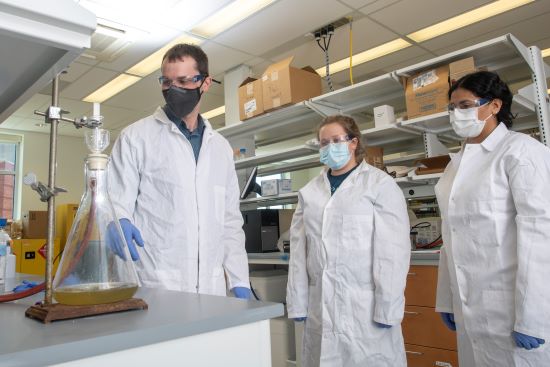George Mason University’s Lee A. Solomon said he owes his National Science Foundation Faculty Early Career Development Award to a lengthy fascination with the interface between biology and technology, and the role that natural protein function may play in that process.
That passion has inspired him to develop a research program using artificial Peptide Amphipiphiles (PAs) to study biological electron transport, and to use what he discovers to develop next-generation electronics materials. The main goal of the project is to design a series of biomaterial-based wires that can be developed into next-generation circuitry that will pave the way for new medicines and energy technologies. The PA-wires will take an active part in information processing and computation, leading to further miniaturized circuit parts, electronic materials and sensors that respond to external stimuli, such as light and magnetic fields.
“The wire itself is going to be a new processor,” said Solomon, an assistant professor in the Department of Chemistry and Biochemistry within the College of Science. “We’re hoping to scale down circuitry even more.”
The NSF grant, which totaled more than $450,000, was a remarkable achievement for Solomon in his first attempt at such an honor. The five-year project, formally named “Developing Peptide Amphiphiles into Next-Generation Electronic Materials and Model Systems to Study Protein Functions,” includes a number of Mason graduate and undergraduate students, and could have far-reaching implications in advancing the study of neurological diseases.
Solomon is the first junior faculty member in the history of the Chemistry and Biochemistry Department to receive the NSF Career Award, prompting department chair Gerald L. R. Weatherspoon to call his recognition “a clear indicator of the depth, breadth and quality of research projects that he brings to the Department of Chemistry and Biochemistry, the College of Science, and STEM research at Mason.”
Solomon’s research proposal was first approved for funding by the Division of Materials Research, which posted a funding rate of 22% for the previous 2020 cycle, Weatherspoon said.
PAs consist of three different sections in the peptide, the lipid tail and the cofactor, and Solomon aims to focus on each of the three during his research. When the project is completed, he and his team hope to integrate all of the chemical and biophysical principles to produce a multifunctioning PA fiber that can reproduce any natural electron transport function. They plan to develop this model system into a multifunctioning wire within an advanced circuit.
“Many fields will have to come together to develop these materials,” Solomon said. “This work will provide a nexus for engineers, biochemists and materials scientists to come together and learn from one another. This will develop a common language that different scientists can use to communicate, fitting within the NSF’s big idea of ‘Growing Convergent Research.’ ”
A former policy fellow in the Department of Energy, Solomon hopes to additionally use the project to help train the next generation of scientists by developing a science policy curriculum for graduate students. He hopes to educate them in becoming as adept in policy as they are in the lab so their skills and expertise can better help shape the country’s future.
Solomon is excited about the honor—and eager to get started.
“It’s been great,” he said. “It feels really good. I’m proud of the work.”


